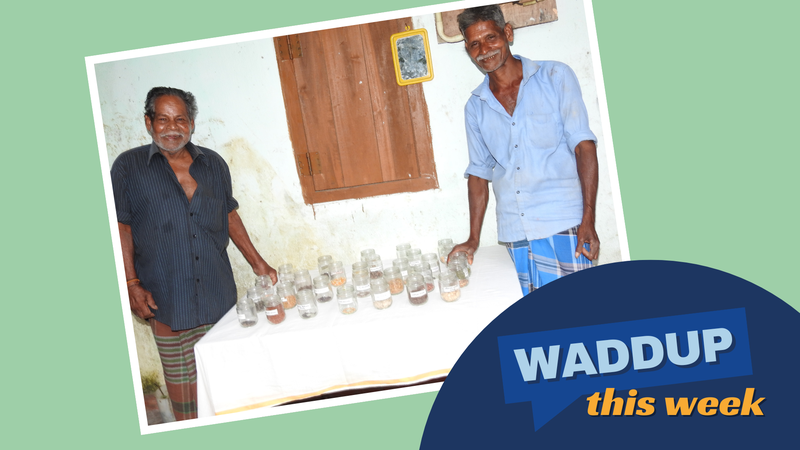When the outcasts become the influencers
Peter Waddup, CEO - The Leprosy Mission Great Britain
Everyone has special skills and talents that can be nurtured. Inside every individual is the potential for brilliance. The thing that breaks my heart the very most about leprosy is that it tramples over a person's dignity. I have sat with people who are utterly broken by the cruelty and prejudice they have endured. So much so that they truly believe they are worthless. Surely this must be the very worst poverty any human being can bear?
In our work to help people affected by leprosy survive the effects of climate change something extraordinary has emerged. The people who were once despised by society have become the influencers. Those that were completely devalued have, in the space of months, become valuable. We could never have quite foreseen the success of what started out to be a practical project.
This week saw the publication of a long-awaited report on climate injustice. Bond's 'Unequal climate justice for people with disabilities' was launched to an audience of movers and shakers in London. It references our life-enhancing work with communities affected by leprosy in Sri Lanka. (You can find a link to the report below if you'd like to read more.)
Over the past 40 years the people of Sri Lanka have endured so much. The 2004 Boxing Day tsunami caused devastation at the end of a bloody 25-year civil conflict. The country is now tentatively emerging from its worst economic crisis as an independent nation. Yet the effects of climate change are further exacerbating its people's problems by damaging harvests. As a result, those living in the communities in which we work are being pushed deeper into poverty. They are increasingly becoming malnourished, leaving them more susceptible to developing leprosy.
Last year the team in Sri Lanka started a new project to help people adapt to climate change. In a bid to train and encourage people affected by leprosy to grow their own food, 16 seed banks were established. They were set up by members of the Leprosy People's Association of Sri Lanka.
The seed banks work like a library. Leprosy People's Association members, and other villagers, are welcome to take seeds. These are stored in glass jars and kept at the homes of people affected by leprosy. There is an understanding that a person will return new seed once they have harvested a crop.
The seed banks have literally transformed the lives of people like Muththulinkam and Nanthakumar. The two friends, who you can see pictured, both bear the physical hallmarks of leprosy. Yet their disabilities have not become a barrier to their running of the seed bank. In fact, the expertise they have honed in a matter of months is nothing short of remarkable!
Fellow villagers began to admire the crops they started to grow from native seed. These include rice, chilli, corn, papaya, cucumber, pumpkin and okra. Because of the seedbank they now enjoy a more varied and nutritious diet. They are further reaping the rewards of their work by selling surplus produce at markets.
Their improved diet and new-found financial security, however, come second to their sense of belonging. They are now respected by everyone. In fact, their knowledge in growing produce using climate resilient approaches is revered. People who once shunned them because of leprosy, now come to their homes. They borrow seed and ask Muththulinkam and Nanthakumar's advice on growing crops. They happily share their successes and learnings when they return seed. This was once unthinkable.
The success of the seed banks has even been supported by academics at the University of Jaffna. The Faculty of Agriculture is now sharing its expertise on growing crops that are the most resilient to climate change. Academics are advising which seeds to stock to best ensure food security. It is so uplifting to hear the stories from the seed banks. From tiny acorns grow mighty oaks.
I was encouraged by the feedback from the launch of Bond's report on Tuesday. My colleague James works on the increased resilience project and attended the London event. He contributed to the report written by the UK's international development network.
The report highlighted that there are 1.3 billion people globally with disabilities. A total of 80 per cent of these people live in developing countries. These are the very people bearing the brunt of the climate crisis right now. And yet they are so often overlooked in overseas programmes designed to mitigate the effects of climate change. They can be completely omitted from climate-related disaster planning.
James was pleased to see that Bond's report was well-received by the Foreign, Commonwealth & Development Office. In their speeches, senior civil servants pledged to include people with disabilities in future climate action programmes.

Muththulinkam (left) and Nanthakumar are both disabled by leprosy and are proud to run the seed bank in their village. They are respected by all for their knowledge and expertise.